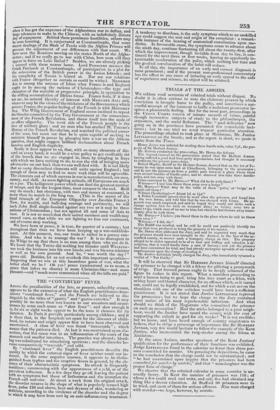THE "CONTINUED" FEVER.
Astoso the peculiarities of the late, or present, unhealthy season, appears to be the extension of what the English practitioners deno- minate "continued fever," and the French are believed to dis- tinguish by the titles of " gastric" and "gastro-enteritis." It may possibly be no more than was known to our ancestors and ances- tresses by some such name as "slow fever" : and slow enough it is, for six or eight weeks appear to be the term it chooses for its duration. In Paris it prevails particularly among children ; and it is there that, in the hospitals set apart for the diseases of child- hood, its nature and origin appear first to have been observed and ascertained. A class of fever was found "intractable" ; which means that the patients died. At last it was ascertained upon dis- section, that the cause was in an inflammation of the coats of the stomach and smaller intestines. The practice was altered ; bleed- ing was substituted for stimulating aperients ; and the disorder be- came comparatively "tractable" and mild.
By " continued fever" the English practitioners describe the quality by which the external signs of fiver neither remit nor in- termit. In the same negative manner, it appears to be distin- guished from typhus and the eruptive fevers in general, by the ab- sence of their characteristic symptoms. Its attack is frequently insidious ; commencing with the appearances of a cud, or of the prevalent influenza. In a few days they go off; leaving the patient with no symptoms but those of listlessness and the sensation the French call mal-also. At about a week from the original attack, the disorder returns in the shape of what is popularly termed high fever, pulse 120 and above, heat and dryness of' skin, wandering or delirium, according to the virulence of the disorder and the degree in which it may have been met by an auti-inflammatory treatment. A tendency to diarrhcea, is the only symptom which to an unskilled eye could suggest the seat and origin of the complaint : a remark- able instance of the bearing of anatomical examination upon me- dicine. In favourable cases, the symptoms cease to advance about the ninth day, continue fluctuating till about the twenty-first, after which the improvement, though invisible from day to day, is con- tinued for the next three or four weeks, leaving an apparently in- terminable acceleration of the pulse, which nothing but time and the gradual corroboration of the habit will reduce.
In all this, the importance of an early and correct diagnosis is most prominent ; and if the present non-professional commentary has the effect in any cases of inducing an early appeal to the aids of experience and science, its object will be attained.


























 Previous page
Previous page